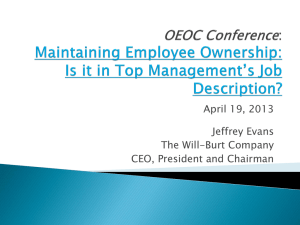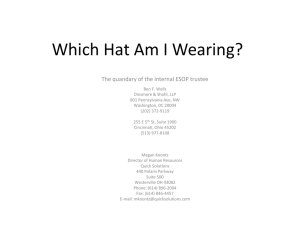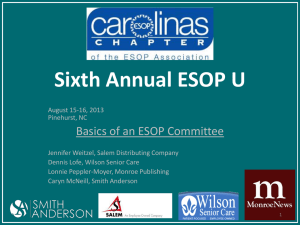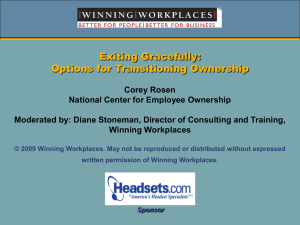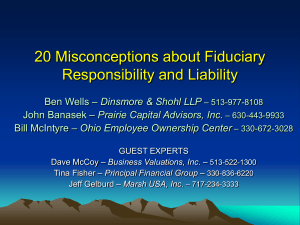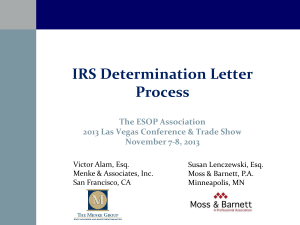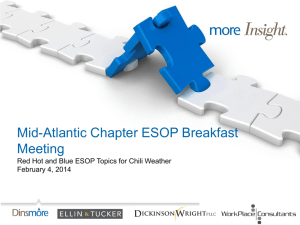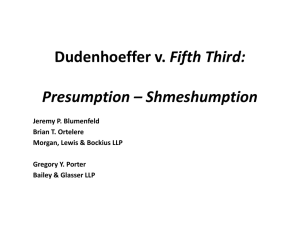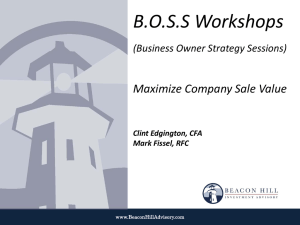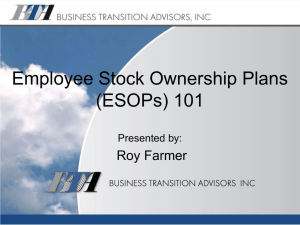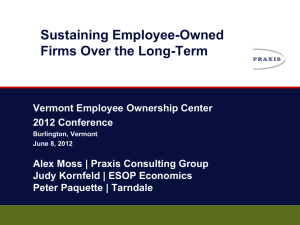SESSION TITLE - Butterfield Schechter LLP
advertisement
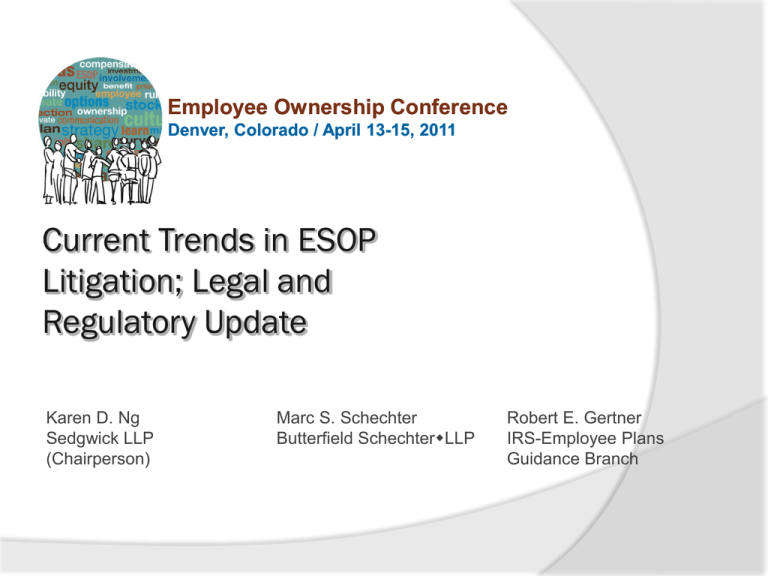
Employee Ownership Conference Denver, Colorado / April 13-15, 2011 Current Trends in ESOP SESSION TITLE Litigation; Legal and Regulatory Update Karen D. Ng Sedgwick LLP (Chairperson) Marc S. Schechter Butterfield SchechterLLP Robert E. Gertner IRS-Employee Plans Guidance Branch Agenda • Regulatory Changes • What Happened Since Last We Met • What is on the Horizon • ESOP Case Law • SPD and Plan conflicts • Financial Disclosure • ESOP Indemnity • Other News in ESOP Litigation Employee Ownership Conference 2011 Increase in User Fees • Revenue Procedure 2011-8 (issued January 3, 2011) • Effective as of February 1, 2011. • User fee to file Form 5300, “Application for Determination for Employee Benefit Plan” is now $2,500 (increased from $1,000) • User fee to file Form 5310, “Application for Determination for Terminating Plans” is now to $2,000 (increased from $1,000). Employee Ownership Conference 2011 Guidance on Reshuffling • Response to Technical Assistance Request #5 • Issued October 8, 2010 • Question: Can you provide for “targeted” reshuffling in order to prevent a non-allocation year under Section 409(p) of the Code? Employee Ownership Conference 2011 Guidance on Reshuffling, cont. • Answer: Maybe, sort of. • According to Section 401(a)(4) of the Code and the regulations issued there under, “Benefits, rights and features” must be provided on a non-discriminatory basis. • The right to a particular form of investment is a “benefit, right or feature.” Employee Ownership Conference 2011 Guidance on Reshuffling, cont. • If an ESOP plan document includes a targeted reshuffling provision, the provision will need to include a means for satisfying the non-discrimination regulations. • Also, when the plan document is submitted to the IRS for a determination letter, TAM #5 instructs the IRS reviewer to reject the submission unless a “Demo 3” is submitted that demonstrates that the provision is not discriminatory. Employee Ownership Conference 2011 Fee Disclosure • • On July 16, 2010, the DOL published interim final regulations (the “Regulations”) under ERISA §408(b)(2) (See 29 CFR 2550.408b-2(c)) which require the disclosure of compensation that “covered service providers” receive directly or indirectly from a “covered plan.” The Regulations become effective on July 16, 2011. Employee Ownership Conference 2011 Fee Disclosure, cont. • • Fiduciary makes a written request to service provider for fee disclosure information. If the fiduciary makes a written request for the information and does not receive it within 90 days of the request, the fiduciary must notify the DOL that the covered service provider failed to comply. Employee Ownership Conference 2011 Fee Disclosure, cont. • • Failure to provide this notice to the DOL will subject the fiduciary to the prohibited transaction rules and penalties. The ESOP fiduciary’s notice to the DOL protects the fiduciary, but not the covered service provider. Employee Ownership Conference 2011 Definition of Fiduciary • On October 21, 2010, the Department of Labor’s Employee Benefits Security Administration issued a proposed rule which, if it becomes final, would expand the definition of a fiduciary under ERISA § 3(21)(A) to include ESOP appraisers and financial advisors. Employee Ownership Conference 2011 Definition of Fiduciary, cont. • Public hearing on March 1 and 2, 2011. • Testimony from ESOP Association, ESCA, AICPA, and American Society of Appraisers. • DOL position appears to be unchanged. Employee Ownership Conference 2011 Definition of Fiduciary, cont. • March 15, 2011 - Joint letter from the Chairs of the House Finance, Education, and Agriculture Committees to the DOL, SEC, and CFTC. • The Chairs ask the DOL to suspend its fiduciary definition rule-making until the SEC completes a rule-making under the DoddFrank Act and a conflict with the CFTC can be resolved. Employee Ownership Conference 2011 Regulatory Update - Notice 2011-19 • Provides guidance regarding when securities of the employer are “readily tradable on an established securities market or readily tradable on an established market.” Employee Ownership Conference 2011 Regulatory Crystal Ball • • Possible new ESOP regulations? Possible issues that might be addressed? • Diversification • S corporation earnings distributions • Section 415 annual additions • Others? Employee Ownership Conference 2011 • • • • SPD and Plan conflicts Financial Disclosure ESOP Indemnity Other News in ESOP Litigation Employee Ownership Conference 2011 Summary Plan Description and Plan Document Conflicts • • • How to resolve an ambiguity between the SPD and the Plan How to resolve a conflict between the SPD and the Plan How to resolve an omission from the SPD of a provision of the Plan Employee Ownership Conference 2011 Resolving an Ambiguity • Ambiguities may be interpreted at the discretion of the plan administrator. Firestone Tire & Rubber, Co. v. Bruch, 489 U.S. 101 (1989). Employee Ownership Conference 2011 Resolving a Conflict • Conflicts are resolved by applying the document that is more favorable to the participants. Bergt v. Retirement Plan for Pilots Employed by Markair, Inc., 293 F.3d 1139 (9th Cir. 2002). Employee Ownership Conference 2011 Resolving Omissions • If there is an omission or the SPD is silent on a provision that is in the Plan Document then the Plan Document controls. Horton v. Phoenix Fuels, Co., 611 F.Supp. 2d 977 (D. Ariz.2009), Wiley v. Cendant Corp. Short Term Disability Plan, 631 F.Supp. 2d 1221 (N.D. Cal. 2009). Employee Ownership Conference 2011 Detrimental Reliance • Must a participant prove that he detrimentally relied on the language of the SPD in order to prevail in a court Split in circuits – currently there is a split in the circuits as to whether participants must prove detrimental reliance on the language of the SPD where the SPD language is more favorable than the language of the plan document. Employee Ownership Conference 2011 Detrimental Reliance Heard By Supreme Court • The Supreme Court will soon issue a ruling on the issue to resolve the split in the circuits. • Cigna Corporation v. Amara Petition for Certiorari granted after Second Circuit ruled that detrimental reliance was an element for Plaintiffs to prove where there is an inconsistency between the SPD and the Plan document. The district court adopted the “likely harm” test and ruled in favor of Plaintiffs, the Second Circuit affirmed. Cigna filed for certiorari arguing that the test should be a “detrimental reliance” test. Oral arguments were held on November 30, 2010, no decision has been issued to date. Employee Ownership Conference 2011 Required Disclosure • Issue: When must an ESOP fiduciary disclose company financial information and what financial information must the fiduciary disclose Employee Ownership Conference 2011 Required Disclosure (cont’d) • • • Statements must be complete Statements must be accurate Fiduciary must consider beneficiary’s circumstances Employee Ownership Conference 2011 Required Disclosure (cont’d) • • Farr v. U.S. W. Commc’ns, Inc., 151 F.3d 908, 914 (9th Cir. 1998) – duty to disclose material information regarding participant’s benefit even if unsolicited. Barker v. American Mobil Power Corp., 64 F.3d 1397, 1403 (9th Cir. 1995) – obligation to convey complete and accurate information material to the beneficiary’s circumstance, even when a beneficiary has not specifically asked for the information. Employee Ownership Conference 2011 Required Disclosure (cont’d) • Bacon v. Stiefel Laboratories, Inc., 677 F.Supp. 2d 1331 (S.D. Fla. 2010) Once a fiduciary chooses to make a statement, he must provide complete and accurate information. The District Court for the Southern District of Florida held that the company had an affirmative duty to disclose information about merger discussions because the company had made offers to participants to take distributions and the offers included the stock price. The court held that the stock price by itself without an explanation about the merger discussions was a misrepresentation to the participants. Employee Ownership Conference 2011 ESOP Indemnity • Issue: Whether participants of an ESOP have an interest in the underlying assets of the sponsoring company so that the company may not itself indemnify the ESOP fiduciaries. Employee Ownership Conference 2011 ESOP Indemnity (cont’d) • Johnson v. Couturier, 572 F.3d 1067 (9th Cir. 2009) The Ninth Circuit Court held that despite lack of a literal ownership interest, ERISA’s fiduciary duty concerning disposition of company funds entitled the ESOP participants to an equitable interest in the assets of the company The Court further held that because the Board of Directors served dually with the Board of Trustees there was substantial overlap between the two roles and decisions of the Board of Directors should be held to ERISA’s fiduciary duty of loyalty and prudence with regard to plan assets and the advancement of legal fees was invalidated. (Although DOL Regs 2510.3-101(h)(3) specifically provide that corporate assets are not plan assets in an ESOP, the DOL reversed its previous position and filed an amicus brief arguing that plan assets were the same as corporate assets and that participants retain at least an equitable interest in the underlying assets of the corporation because they are inextricably tied to plan assets.) Employee Ownership Conference 2011 ESOP Indemnity (cont’d) • Fernandez v. K-M Industries Holding Co., Inc., 546 F.Supp. 2d 1150 (August 21, 2009) Case extends Couturier – “any proceeds taken from the corporation to pay for defendants’ defense costs would reduce the funds available for distribution to ESOP participants. ‘In other words,’ the court stated, advancement was ‘tantamount to asking ESOP participants to pay for Defendants’ defense costs,’ an arrangement that was impermissible under section 410(a).” Id. at 1155 citing Couturier at 1080. Fernandez court noted that “[t]he rationale underlying the [Couturier] court’s holding supports the conclusion that indemnification agreements are invalid any time an ESOP would bear the financial burden of indemnification, whether directly or indirectly. Employee Ownership Conference 2011 ESOP Indemnity (cont’d) • • Conclusion After Courtier Insurance for ESOP fiduciaries Employee Ownership Conference 2011 Stock Drop Cases • Moench v. Robertson, 62 F.3d 553 (3rd Cir. 1995) established that a fiduciary who invests in employer stock is entitled to a presumption that it acted in accordance with the requirements of ERISA and that the presumption can only be overcome by establishing that the fiduciary abused its discretion by investing in employer securities. (NOTE: some courts have rejected this presumption along with the Department of Labor) Employee Ownership Conference 2011 Stock Drop Cases (cont’d) • Ninth Circuit rules on Moench Presumption • Quan v. Computer Sciences Corp. asked, “How bad do things have to be before no reasonable fiduciary in similar circumstances would have continued investing in company stock.” 623 F.3d 870, 882 (9th Cir. 2010) • Quan held that there must be: (1) (2a) (2b) a precipitous decline in stock price and either evidence that the company is on the brink of collapse or evidence that it is undergoing serious mismanagement Employee Ownership Conference 2011 Stock Drop Cases (cont’d) • What is required at pleading stage? The Southern District of New York ruled at the motion to dismiss stage that plaintiff did not have to overcome the Moench presumption, but must rather raise a fair inference that the fiduciaries may have abused their discretion in the decision-making process. Veera v. Ambac Plan Administrative Committee, 2011 WL 43534 (S.D.N.Y Jan. 6, 2011) Employee Ownership Conference 2011 Stock Drop Cases (cont’d) • Pfeil v. State Street Bank and Trust Co., No. 09 CV 12229 (E.D. Mich. Sept. 30, 2010) Court dismissed the case that alleged that State Street should have removed GM stock from the ESOP by 2008 because the employees had the option of investing in many investments other than GM stock. Under the Plan the employees purchased the shares and because the employees had knowledge about GM’s problems the fiduciaries were not liable. Employee Ownership Conference 2011 Stock Drop Cases (cont’d) • Inability of Private Company to Sell ESOP Shares Held Not a Defense • Taylor v. ANB Bancshares, Inc., No. 085170 (W.D. Ark., Oct. 14, 2010) The court rejected the defendant trustee’s argument that the private company could not sell the shares held in the company’s ESOP noting that the trustee was still allowing employee’s to invest in company stock. Employee Ownership Conference 2011 Other News in ESOP Litigation • Request to cap damages • Failure to provide adequate security for ESOP put options • Supreme Court refuses to hear claim that ESOP payouts are deductible dividends • ERISA section 208 governing spinoffs • Challenging IRS determination letter that plan is not qualified • Use of prior valuation for distributions • Prohibited transaction for purchasing private shares when public shares were available Employee Ownership Conference 2011 Request to Cap Damages • Neil v. Zell, No. 08 C 6833 (N.D. Ill. February 28, 2011) The district court rejected GreatBanc Trust Co.’s request to cap potential damages for a minimum of $2.8 mm and maximum of $15.3 mm on a transaction that was $250 mm. The court ruled that it was too early to rule on potential damages. GreatBanc's argument was that it should only be liable for $2.8 mm cash principal payment if made on the promissory note, or a maximum of $15.3 which consisted of the principal plus interest on the note. The company purchased $250mm worth of stock that became worthless. The court stated that the fact that the money was borrowed does not mean the money was not lost. The court noted that it may consider three damages proposals: 1. the difference between the amount paid for the stock and its actual value at the time of purchase 2. the difference between the performance of the ESOP investment and a hypothetical prudent investments, or 3. the total amount lost due to an improper investment Employee Ownership Conference 2011 Failure to Provide Adequate Security for ESOP Put Options • Bank v. Kirk Corp., No. 09A 0788 (Bankr. N.D. Ill., Sept. 3, 2010) Court dismissed a claim against Kirk Corp. because the claim was brought under ERISA section 502(a)(2) which provides for remedies where there is a loss to the Plan. Kirk had a letter of credit with a bank but failed to make sufficient payments. The court noted that the loss was to the participants not the plan and that the participants may have claims under sections 502(a)(1)(B) or 502(a)(3). Employee Ownership Conference 2011 Supreme Court Refuses to Hear Claim that ESOP Payouts Are Deductible Dividends • Nestle Purina Petcare Co. v. Commissioner, No. 09-1339, U.S., Cert. denied, Oct. 4, 2010) Nestlé's petition for certiorari for the U.S. Supreme Court claiming that distributions to ESOP participants should be deductible as dividends under Section 404(k) of the Internal Revenue Code was denied. Employee Ownership Conference 2011 ERISA Section 208 • Chesemore v. Alliance Holdings Inc., 09-cv-413wmc (W.D. Wis. Feb. 17, 2011) Case involved a spinoff from one qualified plan to another. After a series of transactions the company attempted to sell to a third party to no avail. The company decided to sell to its employees through a newly created ESOP. Within four months of the transaction the stock declined 50% and eventually became worthless. ERISA Section 208 Benefits a participant would receive if the plan terminated immediately after a transfer Employee Ownership Conference 2011 ≥ Benefits a participant would receive if the plan terminated immediately prior to a transfer Challenging IRS Determination Letter that Plan Is Not Qualified • Michael C. Hollen, D.D.S., challenged the IRS determination that his ESOP was not qualified from inception in 1987. The court upheld the IRS determination. The IRS gave the following reasons for nonqualification: • amendments required by SBJPA, while timely adopted, did not state the correct effective dates • failure to follow the correct vesting schedule • failed to use an independent appraiser for the purchase of company stock • dividends exceeded section 415 limits (dividends were recharacterized by the IRS as contributions to the account of Dr. Hollen) Employee Ownership Conference 2011 Use of Prior Valuation for Distributions • McCabe v. Capital Mercury Apparel, No. 09 cv 8617 (N.Y.S.D., Nov. 19, 2010) Court permitted the use of the June 2008 valuation for a June 2009 distribution even though the stock had plummeted to 15 cents a share. The court noted that a new valuation probably would have resulted in an even lower value. Employee Ownership Conference 2011 Prohibited Transaction for Purchasing Private Shares When Public Shares Were Available • Neil v. Zell, GreatBanc Trust, and EGI-TRB, No. 08 C 6833 (N.D. Ill., E.D., Nov. 9, 2010) The court granted partial summary judgment against GreatBanc for engaging in a prohibited transaction by purchasing new unregistered shares when public shares were available on the open market. The court ruled that only the publicly traded shares would meet the qualifying employer securities requirement. Employee Ownership Conference 2011 QUESTIONS??? Employee Ownership Conference 2011 Contact Information • Karen D. Ng • Sedgwick LLP • Karen.ng@sedgwicklaw.com • Marc S. Schechter • Butterfield Schechter LLP • MSchechter@bsllp.com • Robert E. Gertner • Internal Revenue Service • robert.e.gertner@irs.gov Employee Ownership Conference 2011
